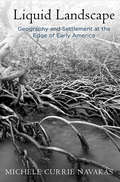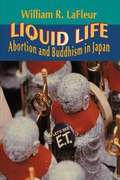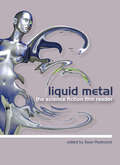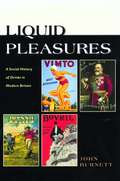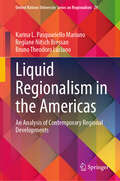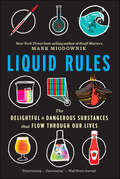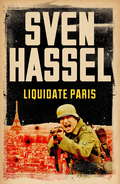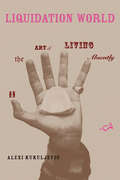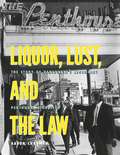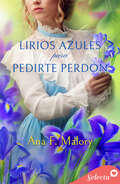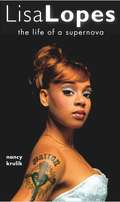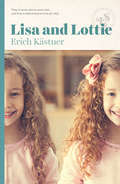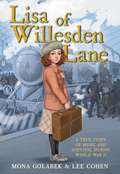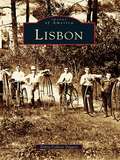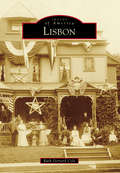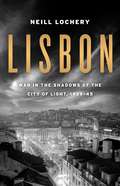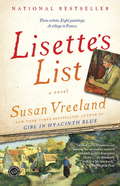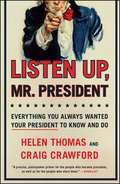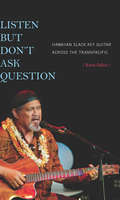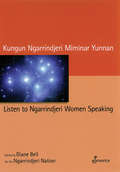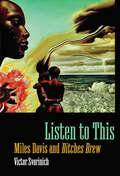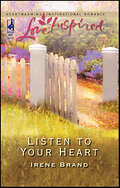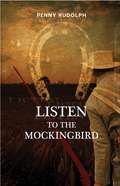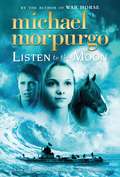- Table View
- List View
Liquid Landscape: Geography and Settlement at the Edge of Early America (Early American Studies)
by Michele Currie NavakasIn Florida, land and water frequently change places with little warning, dissolving homes and communities along with the very concepts of boundaries themselves. While Florida's landscape of saturated swamps, shifting shorelines, coral reefs, and tiny keys initially impeded familiar strategies of early U.S. settlement, such as the establishment of fixed dwellings, sturdy fences, and cultivated fields, over the course of the eighteenth and nineteenth centuries, Americans learned to inhabit Florida's liquid landscape in unconventional but no less transformative ways.In Liquid Landscape, Michele Currie Navakas analyzes the history of Florida's incorporation alongside the development of new ideas of personhood, possession, and political identity within American letters. From early American novels, travel accounts, and geography textbooks, to settlers' guides, maps, natural histories, and land surveys, early American culture turned repeatedly to Florida's shifting lands and waters, as well as to its itinerant enclaves of Native Americans, Spaniards, pirates, and runaway slaves.This preoccupation with Floridian terrain and populations, argues Navakas, reveals a deep American concern with the challenges of settling a region so exceptional in topography, geography, and demography. Navakas reads a vast archive of popular, literary, and reference texts spanning Revolution to Reconstruction, including works by William Bartram, James Fenimore Cooper, and Harriet Beecher Stowe, to uncover an alternative history of American possession, one that did not descend exclusively, or even primarily, from the more familiar legal, political, and philosophical conceptions of American land as enduring, solid, and divisible. The shifting southern edge of early America produced a new language of settlement, belonging, territory, and sovereignty, and that language would ultimately transform how people all across the rapidly changing continent imagined the making of U.S. nation and empire.
Liquid Life: Abortion And Buddhism In Japan
by William R. LafleurWhy would a country strongly influenced by Buddhism's reverence for life allow legalized, widely used abortion? Equally puzzling to many Westerners is the Japanese practice of mizuko rites, in which the parents of aborted fetuses pray for the well-being of these rejected "lives. " In this provocative investigation, William LaFleur examines abortion as a window on the culture and ethics of Japan. At the same time he contributes to the Western debate on abortion, exploring how the Japanese resolve their conflicting emotions privately and avoid the pro-life/pro-choice politics that sharply divide Americans on the issue.
Liquid Metal: The Science Fiction Film Reader (Film Studies)
by Ed. Redmond SeanLiquid Metal brings together 'seminal' essays that have opened up the study of science fiction to serious critical interrogation. Eight distinct sections cover such topics as the cyborg in science fiction; the science fiction city; time travel and the primal scene; science fiction fandom; and the 1950s invasion narratives. Important writings by Susan Sontag, Vivian Sobchack, Steve Neale, J.P. Telotte, Peter Biskind and Constance Penley are included.
Liquid Pleasures: A Social History of Drinks in Modern Britain
by John Burnett Proffessor John BurnettDrinking has always meant much more than satisfying the thirst. Drinking can be a necessity, a comfort, an indulgence or a social activity. Liquid Pleasures is an engrossing study of the social history of drinks in Britain from the late seventeenth century to the present. From the first cup of tea at breakfast to mid-morning coffee, to an eveining beer and a 'night-cap', John Burnett discusses individual drinks and drinking patterns which have varied not least with personal taste but also with age, gender, region and class. He shows how different ages have viewed the same drink as either demon poison or medicine. John Burnett traces the history of what has been drunk in Britain from the 'hot beverage revolution' of the late seventeenth century - connecting drinks and related substances such as sugar to empire - right up to the 'cold drinks revolution' of the late twentieth century, examining the factors which have determined these major changes in our dietary habits.
Liquid Regionalism in the Americas: An Analysis of Contemporary Regional Developments (United Nations University Series on Regionalism #29)
by Karina L. Pasquariello Mariano Regiane Nitsch Bressan Bruno Theodoro LucianoThis book develops a comprehensive analysis of contemporary regionalism in the Americas, which the authors characterise as Liquid Regionalism, given its unstable, flexible and loose characteristics. It innovates by introducing a new concept to assess regional initiatives in the American continents, contributing to Latin American and comparative regionalism research agendas. The book analyses major regional projects in the Americas and develops these into a novel typology of consultation, cooperation and integration. This typology helps explain the level of commitments and institutional depth of regional initiatives across the continent. The book is for scholars, postgraduate and undergraduate students interested in the regional and political dynamics of the Americas across the social sciences, including international relations, political science, sociology, international political economy, international trade, and history.
Liquid Rules: The Delightful and Dangerous Substances That Flow Through Our Lives
by Mark MiodownikThe New York Times–bestselling author of Stuff Matters offers an “entertaining discussion of the various ways our lives are enriched by fluids” (The Wall Street Journal).We know that we need water to survive, and that, for some of us, a cup of coffee or a glass of wine can feel just as vital. But do we really understand how much we rely on liquids, or their destructive power?Set on one of the author's transatlantic flights, Liquid Rules offers readers a tour of these formless substances, told through the language of molecules, droplets, heartbeats, and ocean waves. We encounter fluids within the plane—from hand soap to liquid crystal display screens—and without: in the volcanoes of Iceland, the frozen expanse of Greenland, and the marvelous California coastline. We come to see liquids with wonder and fascination, and to understand their potential for death and destruction.Just as in his bestselling, award-winning Stuff Matters, Mark Miodownik’s unique brand of scientific storytelling brings his subject to life in ways that will inform and amuse science buffs and lay readers alike.Once again, [Miodownik] has written a book much like the substances it describes: exciting, anarchic and surprising. Like the sea, it covers a lot of ground. And like a perfectly made cup of tea, it is warm, comforting and very refreshing.” —The Guardian“At a time when technology, science, and public policy are often at odds, Miodownik adds to our understanding of the physical world with humor and sound science.” —Science
Liquidate Paris (Sven Hassel War Classics)
by Sven HasselLIQUIDATE PARIS shows the eruption of the Second World War in its most brutal and cruel phase, as allied troops advance upon Paris and the penal regiment retreat.I had a grenade in my hand. So, no doubt, did the English private. I tore out the pin with my teeth. Lay there and counted. Twenty-one, twenty-two, twenty-three, twenty-four...It is Hitler's last chance to save the Third Reich...Millions of Allied troops have landed in Normandy.The orders are clear: Sven and his comrades, hardened by a savage war that has led them from the bloody steppes of the Russian Front, to the slopes of Monte Cassino, are ordered to withdraw to Strasbourg and destroy Paris on the way...
Liquidation World: On the Art of Living Absently (Short Circuits)
by Alexi KukuljevicAn examination of the disoriented subject of modernity: a dissolute figure who makes an makes an object of its absence; from Baudelaire to Broodthaers. In Liquidation World, Alexi Kukuljevic examines a distinctive form of subjectivity animating the avant-garde: that of the darkly humorous and utterly disoriented subject of modernity, a dissolute figure that makes an art of its own vacancy, an object of its absence. Shorn of the truly rotten illusion that the world is a fulfilling and meaningful place, these subjects identify themselves by a paradoxical disidentification—through the objects that take their places. They have mastered the art of living absently, of making something with nothing. Traversing their own morbid obsessions, they substitute the nonsensical for sense, the ridiculous for the meaningful. Kukuljevic analyzes a series of artistic practices that illuminate this subjectivity, ranging from Marcel Duchamp's Three Standard Stoppages to Charles Baudelaire's melancholia. He considers the paradox of Duchamp's apparatus in the Stoppages and the strange comedy of Marcel Broodthaers's relation to the readymade; the comic subject in Jacques Vaché and the ridiculous subject in Alfred Jarry; the nihilist in Paul Valéry's Monsieur Teste; Oswald Wiener's interpretation of the dandy; and Charles Baudelaire as a happy melancholic. Along the way, he also touches on the work of Thomas Bernhard, Andy Kaufman, Buster Keaton, and others. Finally, he offers an extended analysis of Danny's escape from his demented father in Stanley Kubrick's The Shining. Each of these subjects is, in Freud's terms, sick—sick in the specific sense that they assume the absence of meaning and the liquidation of value in the world. They concern themselves with art, without assuming its value or meaning. Utterly debased, fundamentally disoriented, they take the void as their medium.
Liquor, Lust and the Law
by Aaron ChapmanThe story of Vancouver's legendary Penthouse nightclub, founded in 1947 and active to this day. In its heyday, acts like Sammy Davis Jr and Nat King Cole performed, and stars like Frank Sinatra and Gary Cooper visited; in the 1970s, the club became infamous for its exotic dancers and a lurid history that included vice squads, politicians, and con men.
Lirios azules para pedirte perdón (Los Talbot #Volumen 2)
by Ana F. MaloryTras la dulce y tierna Rosas amarillas para conquistar a la señorita Remington, Ana F. Malory nos deleita con otra romántica y deliciosa historia. Si te enamoras antes de cumplir tus sueños, ¿debes renunciar a ellos? Alexander Timberlake, vizconde Gainsborough, es un hombre muy ocupado, tanto, que pretende casarse con una joven a la que solo ha visto en una ocasión y logró encandilarlo. Una vez sentadas las condiciones del enlace, regresará a su atareada, aunque aburrida, vida en el campo dejando los preparativos de la boda en manos de la futura vizcondesa. Descubrirla de madrugada, en el puerto, a punto de embarcar rumbo al continente, le obligará a cambiar de planes y actuar en consecuencia. Carla Talbot, cansada de la tranquilidad de la vida rural, ansía viajar, conocer mundo, correr aventuras... Casarse no forma parte de sus prioridades.La inesperada propuesta de matrimonio de un vizconde, al que ni siquiera conoce, será motivo de una discusión familiar y la excusa perfecta para emprender, sola, el viaje que siempre ha deseado hacer. Conocer a bordo del Queen Elizabeth al atento, previsor y apuesto Sander Linton, hará que Carla se replantee su futuro y la clase de vida que desea llevar a partir de ese momento. Se siente dichosa y enamorada..., pero la sombra del vizconde se cernirá sobre ella, haciendo peligrar su felicidad.
Lisa Lopes
by Nancy Krulik"Dreams are hopeless aspirations, inhopes of coming true, believe in yourself, the rest is up to me and you." -- "Waterfalls" Tionne "T-Boz" Watkins, Lisa "Left Eye" Lopes, and Rozanda "Chilli" Thomas came together in Atlanta, Georgia, in the early 1990s to form TLC, a group that blended hip-hop, dance, and R&B music so successfully that it went on to be one of the bestselling female groups of all time. This is the story of how Lisa Lopes, the self-proclaimed "crazy" member of TLC, rose above her difficult childhood to attain superstardom. With her funky raps and her vivacious personality, Lisa pursued her dreams and became known as the most energetic member of TLC, who went on to pave the way for many female groups that followed.
Lisa Marie Wilkinson Romance Bundle
by Lisa Marie WilkinsonIn Stolen Promises, Cultures clash and passions collide when a stunning deathbed confession by his mother sends Evan Dark, the heir to a sprawling South Carolina plantation, to England in search of information about the father he never knew. Evan, a Southern gentleman who has just discovered his Gypsy heritage, cannot resist coming to the aid of a spirited young Gypsy woman, Jade of the Lowara tribe, who has fled her campsite after learning she is betrothed to a brutal clansman. Jade's father, seeing an opportunity to bring wealth to his clan through marriage, pegs Evan as Jade's bridegroom. Coerced into marrying Jade, Evan intends to abandon his Gypsy bride and return to South Carolina, where his own fiancée awaits him, unaware that she has been unfaithful with his half brother and that the two are plotting to challenge Evan's status as heir. When loyalties divide and fortunes are at risk, will Jade's love be enough? In Fire at Midnight, Rachael Penrose is confined to Bedlam insane asylum in London after discovering that her uncle Victor plans to kill her brother in order to inherit the family fortune. Victor, with a gang of criminals, uses French privateer Sebastien Falconer as the scapegoat for his crimes. When Victor spreads the lie that Rachael informed on Falconer's smuggling activities, Falconer vows revenge on the girl. Gripping suspense and romance play out in front of numerous historical details, including a violent storm that devastated England in 1703 and swept the Eddystone Lighthouse into the sea.
Lisa and Lottie
by Erich KastnerIn the book that spawned the beloved movie The Parent Trap, nine-year-old Lisa from Vienna-bold, with a head of curls-meets Munich's buttoned-up Lottie at summer camp. Soon, a newspaper clipping tells the tale: they're identical twins, Lisa living a colorful, big-city life with her father while Lottie keeps house with their gentle mother. Why have their parents separated? And how can they get to the bottom of the mystery? They decide to switch hairstyles, manners, and addresses-and that is where the adventure begins.
Lisa of Willesden Lane: A True Story of Music and Survival During World War II
by Mona Golabek Lee CohenAn inspiring true story about one girl's escape from the Holocaust to become a concert pianist against all odds, made popular by Mona Golabek's acclaimed theatrical performance and the beloved novel The Children of Willesden Lane -- now available in an early chapter book format.In pre-World War II Vienna, Lisa Jura was a musical prodigy who hoped to become a concert pianist. But when enemy forces threatened the city -- especially its Jewish population -- Lisa's parents were forced to make a difficult decision. They secured passage for only one of their three daughters through the Kindertransport, and chose to send gifted Lisa to London for safety. As she yearned to be reunited with her family where she lived in a home for refugee children on Willesden Lane, Lisa's music became a beacon of hope for all of her peers.A story of the power of music to uplift the human spirit, this compelling tribute has moved and inspired hundreds of thousands of students and adults across the globe. Now is the perfect time to bring this timeless story of hope to even younger audiences as Mona Golabek's mission to transform historical testimony into youth empowerment has driven many requests for shorter, illustrated formats. Both a picture book and chapter book will be available.
Lisbon (Images of America)
by Debra Colleen DaggettChief Warumbee sold Ten Miles Falls in 1678, and a century later, the first Lisbon settlement was established along the Androscoggin River. The water's mammoth power generated thousands of jobs and shaped a way of life for Lisbon's earliest citizens. Near beautiful cascading waterfalls, European immigrants found a magnificent place to share hard work, old-world customs, family traditions, and pride in their new home. Lisbon's history is as intricately woven as its fine Worumbo cloth. The town has suffered ravaging floods and fires, yet it has triumphed with the indomitable spirit of the community. In this volume, vivid photographs tell fascinating stories and carefully preserve the past for future generations.
Lisbon (Images of America)
by Ruth Gerrard ColeCentered in the midst of the Columbiana County hills, Lisbon was founded in 1803. High hopes for growth and prosperity were first realized through industries producing iron, coal, and pottery; however, even with modern inventions, fascinating people, and hopes for a successful canal, the dream of becoming a city never materialized. During the Civil War, Confederate general John Hunt Morgan and his raiders threatened the community with invasion, but he ultimately surrendered to Union forces. Many political careers had links to Lisbon, including those of Congressman and Copperhead Clement Vallandigham, Sen. Marcus Hanna, Pres. William McKinley, and Associate Justice of the Supreme Court John Clarke. Intriguing families such as the "Fighting McCooks" added to the community's history. Victorian homes abound, and today effort is put into the restoration of other Lisbon homes as well as businesses, creating genuine charm and interest while commercial and industrial progress stretches northward.
Lisbon: War in the Shadows of the City of Light, 1939-45
by Neill LocheryLisbon had a pivotal role in the history of World War II, though not a gun was fired there. The only European city in which both the Allies and the Axis power operated openly, it was temporary home to much of EuropeOCOs exiled royalty, over one million refugees seeking passage to the U. S. , and a host of spies, secret police, captains of industry, bankers, prominent Jews, writers and artists, escaped POWs, and black marketeers. An operations officer writing in 1944 described the daily scene at LisbonOCOs airport as being like the movie ?Casablanca, OCO times twenty. In this riveting narrative, renowned historian Neill Lochery draws on his relationships with high-level Portuguese contacts, access to records recently uncovered from Portuguese secret police and banking archives, and other unpublished documents to offer a revelatory portrait of the WarOCOs back stage. And he tells the story of how Portugal, a relatively poor European country trying frantically to remain neutral amidst extraordinary pressures, survived the war not only physically intact but significantly wealthier. The countryOCOs emergence as a prosperous European Union nation would be financed in part, it turns out, by a cache of Nazi gold.
Lisette's List: A Novel
by Susan VreelandFrom Susan Vreeland, bestselling author of such acclaimed novels as Girl in Hyacinth Blue, Luncheon of the Boating Party, and Clara and Mr. Tiffany, comes a richly imagined story of a woman's awakening in the south of Vichy France--to the power of art, to the beauty of provincial life, and to love in the midst of war. In 1937, young Lisette Roux and her husband, André, move from Paris to a village in Provence to care for André's grandfather Pascal. Lisette regrets having to give up her dream of becoming a gallery apprentice and longs for the comforts and sophistication of Paris. But as she soon discovers, the hilltop town is rich with unexpected pleasures. Pascal once worked in the nearby ochre mines and later became a pigment salesman and frame maker; while selling his pigments in Paris, he befriended Pissarro and Cézanne, some of whose paintings he received in trade for his frames. Pascal begins to tutor Lisette in both art and life, allowing her to see his small collection of paintings and the Provençal landscape itself in a new light. Inspired by Pascal's advice to "Do the important things first," Lisette begins a list of vows to herself (#4. Learn what makes a painting great). When war breaks out, André goes off to the front, but not before hiding Pascal's paintings to keep them from the Nazis' reach. With German forces spreading across Europe, the sudden fall of Paris, and the rise of Vichy France, Lisette sets out to locate the paintings (#11. Find the paintings in my lifetime). Her search takes her through the stunning French countryside, where she befriends Marc and Bella Chagall, who are in hiding before their flight to America, and acquaints her with the land, her neighbors, and even herself in ways she never dreamed possible. Through joy and tragedy, occupation and liberation, small acts of kindness and great acts of courage, Lisette learns to forgive the past, to live robustly, and to love again.
Listen Up, Mr. President: Everything You Always Wanted Your President to Know and Do
by Helen Thomas Craig CrawfordHelen Thomas has covered the administrations of ten presidents in a career spanning nearly sixty years. She is known for her famous press conference closing line, "Thank you, Mr. President," but here she trades deference for directness. Thomas and veteran journalist Craig Crawford hold nothing back as they use former occupants of the White House to provide a witty, history-rich lesson plan of what it takes to be a good president. Combining sharp observation and dozens of examples from the fi rst presidency through the forty-fourth, the authors outline the qualities, attitudes, and political and personal choices that make for the most successful leaders, and the least. Calvin Coolidge, who hired the fi rst professional speechwriter in the White House, illuminates the importance of choosing words wisely. William Howard Taft, notorious for being so fat he broke his White House bathtub, shows how not to cultivate a strong public image. John F. Kennedy, who could handle the press corps and their questions with aplomb, shows how to establish a rapport with the press and open oneself up to the public. Ronald Reagan, who acknowledged the Iran-Contra affair in a television address, demonstrates how telling hard truths can earn forgiveness and even public trust. By gleaning lessons from past leaders, Thomas and Crawford not only highlight those that future presidents should follow but also pinpoint what Americans should look for and expect in their president. Part history lesson, part presidential primer,Listen Up, Mr. Presidentis smart, entertaining, and exceedingly edifying.
Listen but Don't Ask Question: Hawaiian Slack Key Guitar across the TransPacific
by Kevin FellezsPerformed on an acoustic steel-string guitar with open tunings and a finger-picking technique, Hawaiian slack key guitar music emerged in the mid-nineteenth century. Though performed on a non-Hawaiian instrument, it is widely considered to be an authentic Hawaiian tradition grounded in Hawaiian aesthetics and cultural values. In Listen But Don&’t Ask Question Kevin Fellezs listens to Kanaka Maoli (Native Hawaiian) and non-Hawaiian slack key guitarists in Hawai&‘i, California, and Japan, attentive to the ways in which notions of Kanaka Maoli belonging and authenticity are negotiated and articulated in all three locations. In Hawai&‘i, slack key guitar functions as a sign of Kanaka Maoli cultural renewal, resilience, and resistance in the face of appropriation and occupation, while in Japan it nurtures a merged Japanese-Hawaiian artistic and cultural sensibility. For diasporic Hawaiians in California, it provides a way to claim Hawaiian identity. By demonstrating how slack key guitar is a site for the articulation of Hawaiian values, Fellezs illuminates how slack key guitarists are reconfiguring notions of Hawaiian belonging, aesthetics, and politics throughout the transPacific.
Listen to Ngarrindjeri Women Speaking: Kungun Ngarrindjeri Miminar Yunnan
by Diane BellThe Ngarridjeri women of South Australia reveal their thoughts, daily challenges, and visions for the future in this moving book. The stories range from charming and delightful to jarring and shocking, and delve into matters both social and personal--including the Hindmarsh Island bridge controversy. Serving as a model for how indigenous and nonindigenous women can jointly write a book, this narrative can help indigenous women in other communities develop their own collective history and visions for the future.
Listen to This: Miles Davis and Bitches Brew (American Made Music Series)
by Victor SvorinichListen to This stands out as the first book exclusively dedicated to Davis's watershed 1969 album, Bitches Brew. Victor Svorinich traces its incarnations and inspirations for ten-plus years before its release. The album arrived as the jazz scene waned beneath the rise of rock-and-roll and as Davis (1926–1991) faced large changes in social conditions affecting the African American consciousness. This new climate served as a catalyst for an experiment that many considered a major departure. Davis's new music projected rock-and-roll sensibilities, the experimental essence of 1960s' counterculture, yet also harsh dissonances of African American reality. Many listeners embraced it, while others misunderstood and rejected the concoction. Listen to This is not just the story of Bitches Brew. It reveals much of the legend of Miles Davis—his attitude and will, his grace under pressure, his bands, his relationship to the masses, his business and personal etiquette, and his response to extraordinary social conditions seemingly aligned to bring him down. Svorinich revisits the mystery and skepticism surrounding the album and places it into both a historical and musical context using new interviews, original analysis, recently found recordings, unearthed session data sheets, memoranda, letters, musical transcriptions, scores, and a wealth of other material. Additionally, Listen to This encompasses a thorough examination of producer Teo Macero's archives and Bitches Brew's original session reels in order to provide the only complete day-to-day account of the sessions.
Listen to Your Heart
by Irene BrandLaurel Cooper was too busy planning her only daughter’s wedding to make time for romance. But the fortysomething widow couldn’t ignore the rugged photojournalist who’d appeared on her doorstep to photograph her antebellum home-turned-boarding house. Especially not when they spent so much time together as she gave him tours of other local historic homes. Micah Davidson made himself indispensable, even covering the wedding as a favor for his lovely new landlady. Yet just as Micah was about to propose, a shocking photograph surfaced, turning Laurel’s world upside down. Could their love outlast the long-buried secrets from Laurel’s past?
Listen to the Mockingbird
by Penny RudolphIt's 1861 in New Mexico Territory, and the Civil War is about to have a startling impact on Matty Summerhayes. Matty is struggling to develop a horse ranch to make enough money to return to the East. A stranger dies in her barn...with a map of her land in his pocket. Then war is declared, and Texans invade her valley for the Confederacy. Rumors begin to fly about a lost gold mine and soon someone is trying to run her off her ranch. Then her closest friend Winona -- a one-time slave who is now nearing childbirth -- is about to be stoned for practicing voodoo, and only Matty's creative quick thinking can save her. But when Matty's greatest secret is exposed, she must find a killer or lose her ranch.
Listen to the Moon
by Michael MorpurgoAlfie and his father find a lost girl in an abandoned house on a small island. The girl doesn't speak, except to say what sounds like "Lucy." Alfie's mother nurses her back to health. <P><P>The others in the village suspect the unthinkable: Lucy is actually German--an enemy--because she's found with a blanket with a German tag. <P><P>Told from Alfie and Merry's points of view, this exquisite novel tells of friends, enemies, and unexpected kindnesses.
